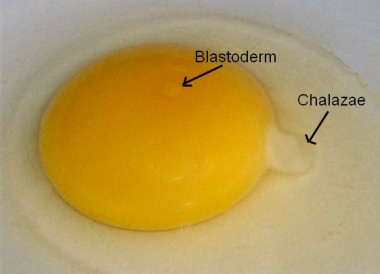May 19, 2012
Eggs - What's That Wiggly Thingy?

A store is no longer stocking our grassfed, free range eggs because a couple of their customers complaint about that 'wiggly thingy' found in our eggs, and that obvious round disc on the egg yolk.
Well, if we were the store owner, this is what we would say to the customer:
1. We try to give our hens as natural a life as possible. This includes plenty of space to roam, grass to eat, and surprise, surprise, a 'husband'. So, as is normal when wives and husbands get together, eggs get fertilised and babies are born. So that disc on the yolk is a fertilised germinal disc, or blastoderm. Unfertilised eggs will have just a speck. Fertilised eggs will have a disc. And we promise you, eating fertilised eggs will not make you more manly and sprout whiskers, nor will it make you pregnant, nor will it make your unborn baby develop 'chicken brainism', a brain disease of unknown origins.
2. And that wiggly thingy is the chalazae, made of the same material as the white of the egg and intended to hold the yolk in place. Chalazae is prominent in the freshest of eggs. It dissolves and disappears as the egg ages. So, dear customer, the eggs with absolutely no chalazae that you have been eating are clearly not fresh inspite of the words printed in bold on the label, Farm Fresh. 'Chicken Brainism' is a disease common amongst modern consumers and we have no idea where the disease comes from but we can assure you it does not come from eating fresh eggs from hens that are allowed to lead as natural a life as possible.
12:10 Posted in Blog, Chickens | Permalink | Comments (0) | Tags: organic eggs, free range eggs, blastoderm, chalazae







